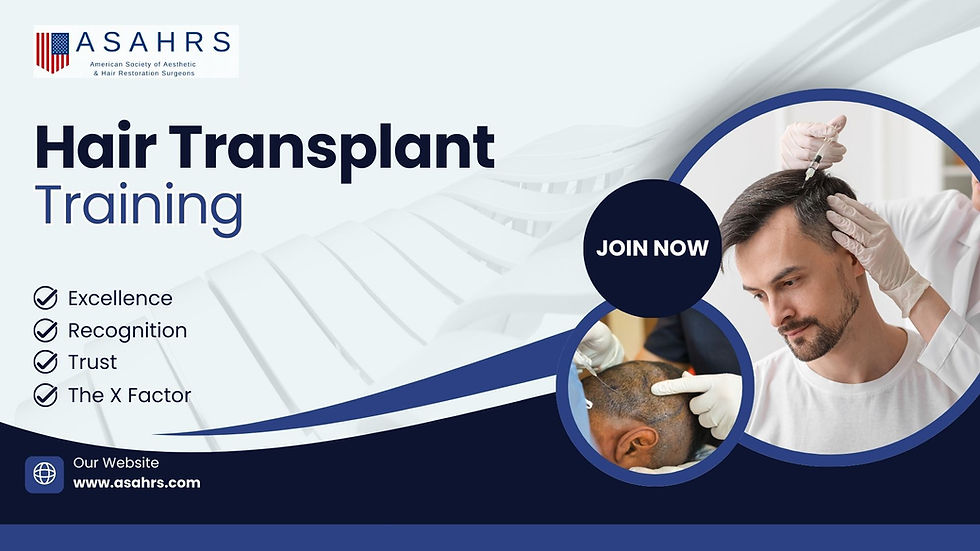Essential Steps to Prepare for Your Hair Transplant Journey
- Tech Blogger
- May 6, 2025
- 4 min read

Thinking about a hair transplant? The journey towards fuller hair can be exciting yet daunting. Preparing adequately for a hair transplant is crucial for achieving the best possible results. In this comprehensive guide, we’ll cover everything you need to know before undergoing this transformative procedure, from research to recovery.
Understanding the Basics of Hair Transplants
Before diving into preparation, it's important to understand what a hair transplant entails. A hair transplant is a surgical procedure that involves moving hair follicles from one part of the body (usually the back of the head) to areas experiencing hair loss. The outcome can restore not just your hair but also your self-confidence.
Researching the Procedure
The first step in preparation is thorough research. Look into various hair transplant courses that doctors and nurses partake in, as it is essential to select a provider equipped with the latest techniques. Understanding these methodologies can help you make informed choices regarding your practitioner.
Look for clinics with high patient satisfaction.
Read reviews and testimonials.
Check if their team has undertaken hair transplant training programs.
Choosing the Right Surgeon
Your surgeon’s expertise can significantly impact the success of your hair transplant. Ensure you verify their qualifications, training history, and experience performing hair transplants. Opt for a surgeon who has undergone a solid hair transplant fellowship and holds a valid hair transplant certification.
Questions to Ask Your Potential Surgeon
Preparing for your consultation can lead to productive conversations. Here are some essential questions to consider asking:
What is your training background in hair restoration?
How many hair transplant procedures have you performed?
Can you show me before-and-after photos of prior patients?
What techniques do you use, and why do you prefer them?
What potential risks are associated with the procedure?
Preparing Physically and Mentally
Physical and mental preparation is just as vital as finding the right surgeon. Here are some tips to consider:
Physically Prepare Your Body
Stop Smoking: Nicotine can interfere with blood circulation which is crucial for healing.
Avoid Certain Medications: Inform your doctor of all medications you’re taking. Some medications, like blood thinners, need to be paused before surgery.
Maintain a Healthy Diet: A balanced diet rich in vitamins and minerals can promote healing.
Mental Preparation
Prepare yourself mentally for the changes to come. It's normal to feel anxious or fearful. Understanding that hair restoration is a gradual process can help set realistic expectations for your outcome.
Planning for the Surgery Day
On the day of your procedure, make sure to follow your surgeon's instructions precisely. Key considerations include:
Transportation: Arrange for a ride to and from the clinic.
Comfortable Clothing: Wear something easy to remove for the surgery.
Arrive Early: Ensure you arrive early to go through any last-minute paperwork.
Understanding the Procedure Itself
During a hair transplant, you will likely experience local anesthesia. The procedure may take several hours, depending on the technique used. Here’s what typically happens:
Extraction: Follicles are harvested from the donor area.
Preparation: The extracted follicles are prepared for implantation.
Implantation: Follicles are implanted in the areas of thinning or baldness.
The Road to Recovery
Post-surgery care is equally important for optimal results. Your surgeon will provide specific aftercare instructions to follow to ensure a smooth recovery.
Post-Operative Care Tips
Avoid Strenuous Activities: Refrain from heavy lifting or vigorous exercise for at least a week.
Keep the Area Clean: Follow your doctor's instructions for cleaning the donor and recipient areas.
Monitor for Complications: Be aware of signs of infection and contact your surgeon if you have concerns.
Long-Term Expectations After a Hair Transplant
It’s crucial to have realistic expectations regarding hair growth. Hair may fall out initially before regrowing thicker and fuller hair. This process typically takes several months. Regular follow-up appointments with your surgeon will ensure you stay on track.
The Role of Further Education
Beyond Hair: A Journey of Self-Discovery
Deciding to undergo a hair transplant is about more than just hair; it’s about reclaiming confidence and possibly changing the way you live your life. Emphasizing self-care and mental well-being during this journey is essential, as the physical transformation can have a profound effect on your overall happiness.
By preparing adequately for your hair transplant, you are taking the first vital steps towards not only achieving a fuller head of hair but also ensuring that the experience is as seamless and rewarding as possible. Together, armed with knowledge and a skilled professional by your side, you’ll soon be on your way to a renewed sense of self.
FAQs
What is a hair transplant?
A hair transplant is a surgical procedure that involves moving hair follicles from one part of the body, usually the back of the head, to areas experiencing hair loss.
How do I prepare for a hair transplant?
Preparing for a hair transplant involves thorough research on the procedure, choosing the right surgeon, and physically and mentally preparing yourself.
What should I look for when choosing a hair transplant surgeon?
Look for a surgeon with a solid training background in hair restoration, a valid certification, and extensive experience performing hair transplant procedures.
What are some pre-surgery preparations I should consider?
Stop smoking, avoid certain medications, and maintain a healthy diet to prepare your body for the procedure.
What should I expect after the hair transplant surgery?
After surgery, expect an initial hair fall followed by regrowth over several months; follow your surgeon's post-operative care instructions for the best results.
.png)



Comments